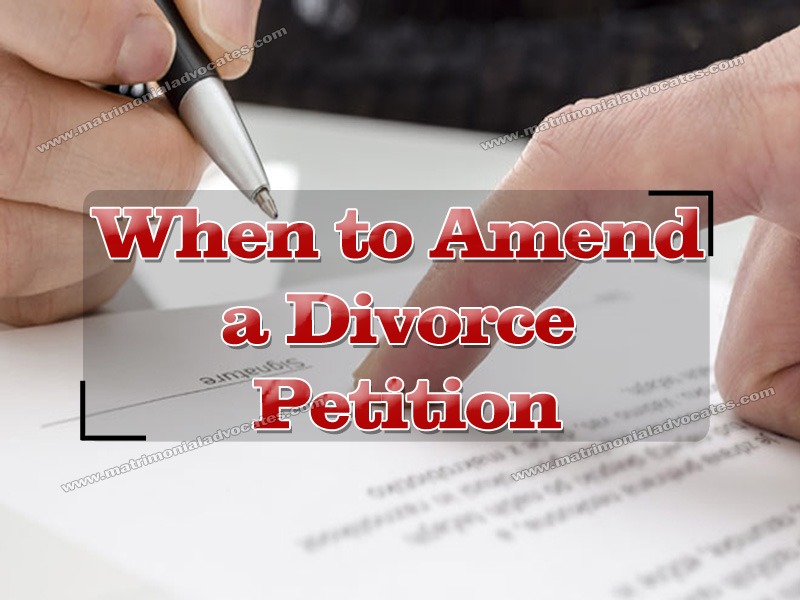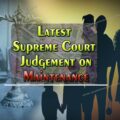
Amendments to any divorce petition help the parties to correct their mistakes in such petitions. As a general rule, every petition, including a divorce petition, must state material facts and necessary particulars such that the decision of the court cannot be based on grounds outside the petition. However, often situation arise wherein a party finds it necessary to amend its petition before or during the trial.
Amendment to petitions can be made under Order VI Rule 17 of the Code of Civil Procedure, 1908, which reads as follows:
“Amendment of pleadings – The Court may at any stage of the proceedings allow either party to alter or amend his pleadings in such manner and on such terms as may be just, and all such amendments shall be made as may be necessary for the purpose of determining the real questions in controversy between the parties.
Provided that no application for amendment shall be allowed after the trial has commenced, unless the court comes to the conclusion that in spite of due diligence, the party could not have raised the matter before the commencement of trial.
Note: The provisions of Rule 17 of Order VI are not exhaustive of the power of a court in a matter of amendment or pleadings. The power of amendment is inherent in the court and where Rule 17 does not apply, resort can taken to section 151 of the Code.
However, it must be borne in mind that the intent behind the provisions for amendment of pleadings is intended for meeting the ends of justice and not for defeating them. The ultimate aim of a court is to exist for the purpose of administering justice between the parties and not to punish them, and thus they are empowered to grant amendment of pleadings in the large interest of doing full and complete justice to the parties.
- Circumstances under which court allows amendment to a divorce petition
The court has reiterated again in different cases a minimum of two conditions need to be met prior to granting a leave for amendment, such as:
- That such amendment should ne cause any injustice to the opposite party
- That such amendment is necessary for determining the real question in controversy.
{ Kisandas Rupchand And Ors. vs Rachappa Vithoba Shilvant 1909 4 Ind Cas 726}
In the case of Rajkumar Gurawara (Dead) Thr. L.Rs. vs S.K. Sarawagi And Co. Pvt. Ltd. & Anr, the following circumstances were discussed down by the Hon’ble Supreme Court wherein a leave to amend can be granted:
“It is settled law that the grant of application for amendment be subject to certain conditions, namely,
- when the nature of it is changed by permitting amendment;
- when the amendment would result introducing new cause of action and intends to prejudice the other party;
- when allowing amendment application defeats the law of limitation.”
Other points on which Amendments of Pleadings is granted:
- When the application of amendment is filed to avoid multiplicity of suits.
- When parties in the plaint or written statements wrongfully described.
- When the plaintiff omits to add some properties to the plaint.
- In the case of Smt. Preeti v. Sandeep Asthana
“A point for consideration arose in the present suit whether a case filed under section 9 of the Act for restitution of conjugal rights by a party can be permitted to be converted to one having been filed under section 13 of the Act by allowing the amendment application moved under Order 6 Rule 17 CPC read with section 151 CPC. From the side of wife, though no written statement had been filed but an objection was filed against the amendment application denying all the allegations made against her Overruling the objection of the appellant, the learned family court below expressed its opinion that the said amendment application deserved to be allowed because the Supreme Court had in various cases held that amendments should be allowed which would help the Court in finally deciding the case. In the present case at hand it was found that the mediation between the parties had failed and a direction had also been issued by the High Court for expeditious disposal. In this view of the matter, in case the said amendment was disallowed, it would require the respondent to institute a fresh case for divorce under section 13 of the Act, which would delay the disposal of the dispute between the parties…Thus in order to avoid multiplicity of suits, the amendment was required. It may further be mentioned that when alternative reliefs can be prayed for, conversion of one relief into another would not be barred”.
There is difference of judicial opinion on the question whether in a petition for restitution of conjugal rights an alternative prayer for divorce could be sought. The High Courts of Allahabad and Madhya Pradesh have held that such proceedings could ensure. The High Court of Himachal Pradesh has taken a contrary view. Desertion is the forsaking of all marital obligations. By deserting his spouse without any reasonable cause and without the consent of the deserted spouse. The deserted spouse has a right in law to seek restitution of the marital tie, and all its obligations on part of the respondent. Decisions based on abandonment have held that such conduct by the deserting spouse may entitle the deserted spouse to seek a divorce. In the humble opinion of the author, no plaintiff can be estopped from claiming or seeking alternative reliefs. The seeking of one relief, as opposed to another, would not render the proceedings not maintainable. Thus, reference is invited to the provisions of Order 7 Rule 7 of CPC, which stipulates that every plaint shall state specifically the relief, which the plaintiff claims, either simply or in the alternative. There is thus, no legal bar against the plaintiff seeking two apparently diagonally opposite reliefs.






Can I amend my petition for divorce once it’s been filed?
Yes, modification can be done to the filed petition.